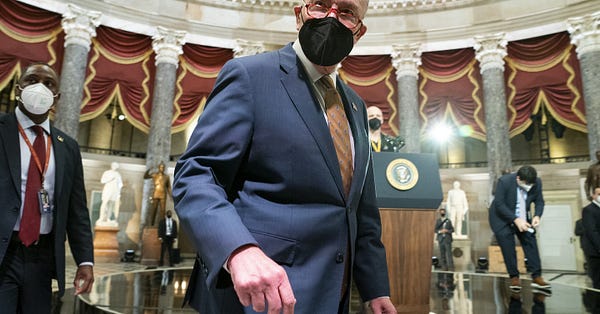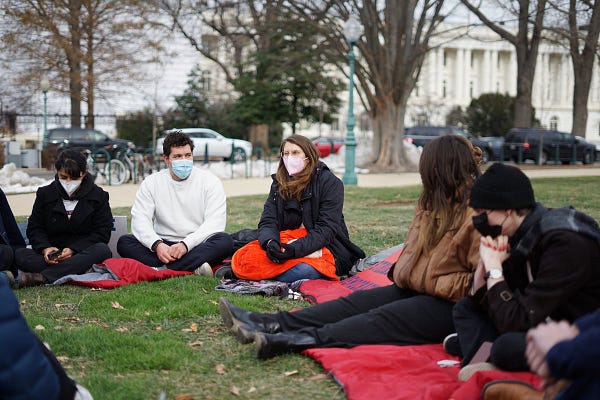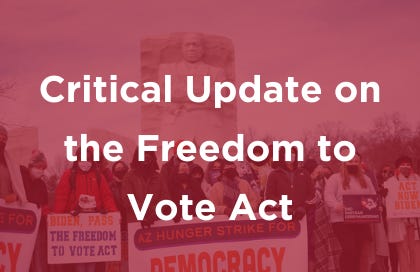Critical Update on the Freedom to Vote Act
Dispatches on the Freedom to Vote Act (Edition #39)
Welcome back to the Equal Citizens Substack! As always, there are major legislative updates. This is also likely the last time I will write before the conclusion of the Freedom to Vote Act fight in Congress (yes, we’ve reached the true end game…).
I’m currently in Washington D.C. with Equal Citizens Executive Director Adam Eichen. We made a last minute trip to the nation’s capital to support a group of brave young people who started a hunger strike for democracy on Thursday (many of them took part in December’s hunger strike). I’ll have more to say about these youth leaders below.
Two quick notes before we jump in. First, there are going to be a few twists and turns that I have to describe. I’m going to do my best to make it as easy as possible to understand, but please reach out if you have any questions. Second, for reasons that I will detail, the Freedom to Vote Act and John Lewis Voting Rights Advancement Act were combined into one bill, now called the “Freedom to Vote: John R. Lewis Act.” I will refer to it as the “Freedom to Vote John Lewis Act”, or FTVJLA.
Biden Starts Fighting:
On Tuesday, President Biden gave his long-awaited speech on voting rights in Atlanta, Georgia (which you can watch here). With the national cameras on him, he made it clear that he views the attacks on our democracy by state legislatures as existential threats to our nation. And, in response, he forcefully called upon the Senate to do whatever it takes to get both the Freedom to Vote Act and John Lewis Voting Rights Advancement Act to his desk. He did not mince words on what this entailed. He asked the Senate to reform its filibuster rules:
“State legislatures can pass anti-voting laws with simple majorities. If they can do that, then the United States Senate should be able to protect voting rights by a simple majority.
Today I’m making it clear: To protect our democracy, I support changing the Senate rules, whichever way they need to be changed to prevent a minority of senators from blocking action on voting rights.”
He later proclaimed:
“So, I ask every elected official in America: How do you want to be remembered? At consequential moments in history, they present a choice: Do you want to be on the side of Dr. King or George Wallace? Do you want to be on the side of John Lewis or Bull Connor? Do you want to be on the side of Abraham Lincoln or Jefferson Davis? This is the moment to decide to defend our elections, to defend our democracy.”
On the heels of his moving January 6th speech, the President was clear-eyed on Tuesday about the dangers our democracy faces and overall he rose to the occasion. As you know, activists had been pushing the President to use his bully pulpit to push for voting rights and filibuster reform for months. With this speech you could tell that Biden heard the call and was ready to take action.
While the President doesn’t get to vote in the Senate, he plays a critical role in setting the narrative. The hope was (and is) that by having the President enter the fray, momentum would be generated and mountains moved.
And on Thursday, Biden went further, finally acting as a negotiator. He joined the Senate Democrats for their caucus lunch, where he reportedly discussed the importance of passing voting rights legislation and the need to reform the filibuster to get it done. That evening, Biden hosted Senators Manchin and Sinema at the White House to try to negotiate with them (both Senators had announced that afternoon that they remained opposed to reforming the filibuster to pass the Freedom to Vote John Lewis Act). The details of this meeting have not been reported.
Schumer Wants to Vote:
Let’s return back to the beginning of the week, before Biden’s speech.
Senate Majority Leader Schumer had a plan. The goal was to vote to proceed to debate on the Freedom to Vote Act, and then do the same for the John Lewis Voting Rights Advancement Act. (Remember, there are two filibuster hurdles that have to be cleared, first to proceed to debate and afterwards to actually vote on the bill.) When these votes to proceed to debate failed to clear 60 votes needed to break the filibuster, Schumer would subsequently call to change the Senate rules, which would set in motion an actual vote to reform the filibuster.
As you might expect, plans change rapidly on Capitol Hill. Try to stick with me here as I explain what changed, why it is significant, and what happened next. It is quite complex.
To maximize the debate time — perhaps in an attempt to increase pressure on the filibuster holdouts — the Democrats came up with a strategy to bypass the vote on a motion to proceed to debate. In other words, they found a way to hold a full debate on the democracy bills without the threat of the first filibuster. They did so by replacing the text of a completely separate bill in the House (dealing with NASA) with both the Freedom to Vote Act and the John Lewis Voting Rights Advancement Act, renaming it the Freedom to Vote John Lewis Act. The House then moved the bill through the necessary committee and passed it on the floor (220-203). When the bill transferred to the Senate, it became subject to immediate debate — no motion to proceed required.
Okay, you are surely thinking….Excuse me, what?
Fair question! The short story is that the NASA bill had already moved back and forth between the House and Senate multiple times. When this happens, the bill in question is no longer subject to a filibuster on the motion to proceed to debate upon its return to the Senate. Therefore, the bill can be debated without any hurdles. In short, the Democrats used the NASA bill as a vehicle into which they placed the FTVJLA.
Pause for a moment. Here’s the takeaway: No matter what, the Senate now has a route to debate voting rights on the Senate floor. This is good news. We’ve never gotten this far before. Of course, Republicans can still filibuster on the motion to proceed to a vote, so roadblocks remain.
This plan came together on Thursday as Biden went to the Hill. The hope was to start debate on the FTVJLA on Friday, setting up a rules vote on Monday (MLK Day) — which was the deadline Schumer set at the beginning of the month. Unfortunately, due to an impending snow storm in D.C. and concerns about COVID-19 (Sen. Schatz of Hawaii tested positive for COVID), the Senate adjourned for the weekend and will be back in session on Tuesday.
So where does this leave us? The Senate will debate the Freedom to Vote John Lewis Act on Tuesday. We do not know how long this debate will last, but we fully expect it to be contentious and that the Democratic caucus will use it as an opportunity to publicly persuade Sens. Manchin and Sinema to endorse filibuster reform to pass the FTVJLA. When debate has run its course, the Senate will move to end debate to put the bill to a vote. This is when the Republicans will filibuster to stop the vote (again, the NASA-swap doesn’t get rid of the filibuster on the vote itself!). Democrats will not have enough votes to end the filibuster (they need 60). When this happens, Majority Leader Schumer will force a vote to alter the Senate rules to fix the filibuster.
With Sens. Manchin and Sinema both expressing on Thursday that they oppose changing the filibuster, the press has said that the fight is over. The vote to fix the filibuster will fail, they say. I cannot tell you if this is the correct interpretation; I cannot see into the future. But what I can tell you definitively is that we, and the activists on the ground, will continue to push as hard as we can until the Senate vote begins.
This is not the time to give up; the fight continues.
Youth Hunger Strike:
On Thursday, our friends at Un-PAC restarted their Hunger Strike for Democracy in Washington D.C. (outside the Capitol Building). Over 40 young people are going without food indefinitely in a final push to get the Senate to reform the rules to pass the Freedom to Vote John Lewis Act. These brave activists are willing to put their bodies on the line for our democracy and we applaud their efforts.
As mentioned, this week, Equal Citizens Executive Director Adam Eichen and I traveled down to D.C. to support the strikers. We hung out with them, attended their afternoon rallies, and did whatever we could to stand in solidarity. Yesterday, in from of the MLK Jr. Memorial, Adam even gave a speech to the strikers lauding their efforts and their place in history. You can watch it here.

As a reminder, Un-PAC waged a hunger strike that lasted 15 days in December. Our founder Lawrence Lessig was so inspired by their commitment that he even joined it. The strike was integral in getting Majority Leader Schumer to prioritize the FTVJLA in the new year.
I have so much more I could say about the hunger strikers, but instead of giving you my perspective, I asked Shana Gallagher, the Executive Director of UnPAC, to write directly to you to give a sense of what’s happening and what you should take away from it:
“Hi Equal Citizens Substack! My name is Shana, I’m the co-founder and Executive Director of Un-PAC, the group organizing the hunger strike — and today I’m on Day 4 of my Hunger Strike for Democracy! I am incredibly inspired and humbled by the sacrifice of our young strikers, and proud to join them. They understand that everything is on the line, including their futures, and that solutions to all the problems facing young people are blocked by our broken system of legalized corruption. Students and young people have always been on the frontlines of positive social change, and the fight to save our democracy is no different.
The Hunger Strike for Democracy relaunched on Thursday, January 13th. Compared to our last one in December, this strike is double the size: a total of over 40 young people now. Every day, more strikers arrive in solidarity. Day 4 is one of the hardest days for a hunger strike. The students and young people are really feeling the effects. Several are experiencing migraines, one has severe cramping and abdominal pain, and yesterday one of the strikers fainted while at the MLK Memorial. Obviously the cold (31 degrees yesterday!) and the ongoing COVID pandemic doesn't make things easier, but everyone is deeply committed to maintaining their strike in order to plead that the Senate take seriously this urgent, existential moment of opportunity to save democracy.
If there is one thing I hope that you can take from these Un-PAC youth activists: Don’t give up. Even if the odds are stacked against us, we need to keep fighting. Our democracy is far too important to ever stop protecting it. And if you want to follow along, we post constant updates on our Twitter (@LetsUnPac)”
If you want to send a message of support to the #HungerStrike4Democracy activists, feel free to send us an email at info@equalcitizens.us and I’ll be sure to forward it along.
More Activism:
This is the final stretch and making your voice heard is now imperative. This holiday weekend, we normally celebrate the life of civil rights hero Martin Luther King Jr. However, the King Family has declared that if Democrats do not pass voting rights legislation, the holiday should not be celebrated. In its place, they want protests.
The King Family arranged two actions and encouraged grassroots activism to occur elsewhere throughout the country. On Saturday, the King Family marched in Arizona and generated significant press. On Monday, they will head to D.C. with other prominent politicians and activists. You can check out the details of the events in Arizona and D.C. here.
If you are inspired, DFAD has created a website for ways to get involved. Take a look for actions near you!
Make sure to subscribe to this Substack to stay up to date on the FTVJA.
In the News:
In Politico, the Brennan Center’s President Michael Waldman penned a historical analysis arguing that voting rights legislation has not usually been bipartisan. Numerous voting rights victories, including the 15th Amendment and the National Voter Registration Act, were passed on a party-line vote.
The Brennan Center for Justice published a fact sheet about the negative impacts of voter suppression on communities of color. This is a very useful explainer that can be shared widely.
In the Atlantic, Ronald Brownstein argues that it is time for the Democrats to pass voting rights legislation without Republican support. He points to January 6th — and what has happened since — and calls on Democrats to act urgently to defend our democracy.
Juan Williams, a political analyst for Fox News, writes that “democracy will die unless voting rights are protected.” He concludes: “Now it is time for all Senate Democrats — and Republicans willing to step outside the Trump cult — to preserve voting rights for all against a deceitful, violent effort to end American democracy.”
Bonus: Play mini golf to see how politicians tilt elections using maps
Don’t forget to keep your friends, family, and colleagues in the loop by sharing this Substack with them.
Social Media Roundup:
Let’s be frank: there are A LOT of tweets, posts, and general conversation about the Freedom to Vote John Lewis Act. In this section, we give you an overview of the tweets and media you really need to see.









More Ways to Help!
We are in possibly one of the most critical moments for American democracy since the Voting Rights Act of 1965. We need all the help we can get to push the Freedom to Vote John Lewis Act over the finish line! Here are more ways to join the fight to protect American democracy:
Call your senators and tell them that you support reforming the filibuster for voting rights legislation. You can find your senators’ phone numbers, as well as where they stand on the filibuster, using our handy filibuster tracker!
Common Cause and End Citizens United are organizing regular phone banks in support of the Freedom to Vote John Lewis Act. This is a great opportunity to spread the word and help constituents contact their Senators in support of the bill. Check them out here and here.
You can also text DEMOCRACY to 33339 to receive a daily text message reminder to call your senators in support of voting rights legislation.
The League of Women Voters can also help you contact the White House here.
Write a letter to the editor in your local paper sharing your support of the Freedom to Vote John Lewis Act and urging your Senators to pass it. Not sure how to write a letter to the editor? Reach out to us at info@equalcitizens.us and we can help!
Share our newsletter, our podcast, the articles included above, and the resources on the bill below on social media and tell your friends why you support #FreedomtoVote
For more ways to help, check out the Democracy Movement’s ‘Take Action’ page, where you can see state-specific organizations that you can join!
Extra, Extra:
If, after reading our newsletter, you still want to know more about the Freedom to Vote John Lewis Act or Equal Citizens you can find more information in this section! If you have questions about the bill you want us to answer in our Substack, tweet at us with #FTVASubstack! Also, don’t forget to follow us on Instagram, Twitter, and Facebook for more updates throughout the week.
Relevant Resources:
Here are a few resources on the Freedom to Vote John Lewis Act if you have questions:
Equal Citizens launched a filibuster tracker, so you can see where your senator stands on the filibuster. It also includes their phone numbers and their Twitter handles, so you can get in touch with them directly and push them to support filibuster reform!
The Brennan Center for Justice created a wonderful guide to the Freedom to Vote Act. Check it out here. They also have a wonderful guide to the John Lewis Voting Rights Advancement Act, which you can check out here.
Additionally, the Brennan Center created an extensive fact sheet on the differences between the Freedom to Vote Act and the For the People Act, which I highly suggest checking out here.
More About Me:
Kevin Rissmiller is a fellow at Equal Citizens and a Goodwin-Niering Scholar at Connecticut College majoring in Government and exploring sociology, economics, and applied statistics. In his free time, you will find him at Dunkins or (pre-pandemic) playing ultimate frisbee. Connect with him on LinkedIn.
If you want more updates on federal voting rights legislation from Kevin, then subscribe here!


